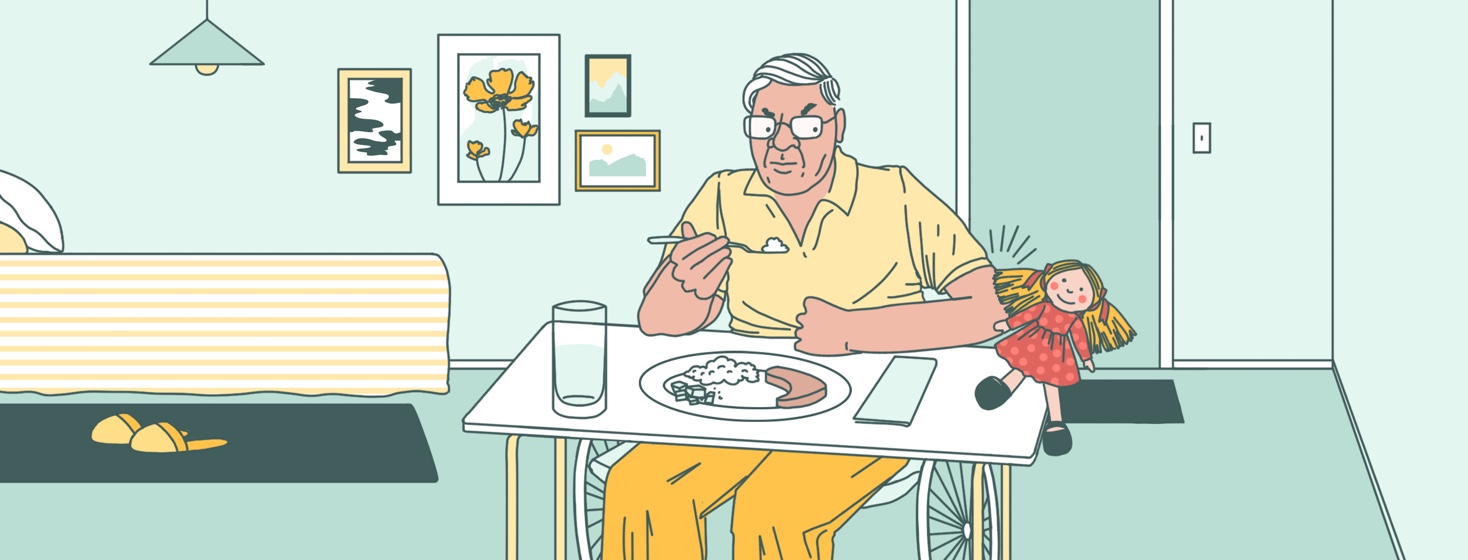Common Symptoms of Alzheimer's: Calming Dad's Anger and Agitation
I knew very little about how to calm a person with Alzheimer's who was agitated. I knew Dad was agitated a lot. I assumed it was because he was losing control of his world, and honestly, it was part of his personality in the first place. When Mom would talk about it, she would describe some of those times with Dad. I learned some therapies are common for dealing with anger and agitation. Some of these are useful, some are not allowed, and some are strange.
Daily routines help those with Alzheimer's
It wasn't until Dad moved to his new memory care home that I realized it was part of the disease as it progressed. After a very short time, Dad calmed down. I attributed this partly to the fact that Dad now had a 'routine' day, routine activities. At home, he had no real routine other than his 3 meals a day, primarily because Mom let Dad lead the day, even beyond his capacity.
Animal therapy
I recently wrote about a couple of amazing dogs that managed to calm Dad. Now, I swear by animal therapy. I had some pretty amazing memories of Dad's smile when the pups were near him.
Familiar voices
Many times I saw my Mom use a soft voice and her touch to calm Dad. She would talk quietly in his ear and remind him as he was swearing or being nasty to someone - that wasn't how you treat people. Even when he could no longer speak and the agitation was great, Mom would stroke his head and hair and again talk softly into his ear. I was in awe of how well that always seemed to work. It also speaks to the love Mom had for Dad.
Medications to treat anger & agitation
My husband told me, in an attempt to prepare me, they would medicate Dad once he got to his memory care home. We had more than one conversation go south because I didn't want to hear that they would 'sedate' him. At least, that was my interpretation. What kind of life would that be if he was constantly sedated?
That wasn't how it was. Medication was needed to help Dad cope. It wasn't so staff could lounge around. It wasn't needed because the memory care home was understaffed. It was needed for Dad's health. I could see the difference in him very quickly. As Dad was unable to communicate verbally, he expressed his displeasure by waving his fist at the staff. They had an amazing way of cajoling him out of his displeasure and gained his cooperation. Reflecting back, I fail to understand why Dad wasn't started on some medications for anger and agitation in those years he lived at home that were hell on Mom. Guess I won't ever have an answer to that one.
Music therapy
Music was definitely a calming influence on my dad. Music was part of my life growing up because it was part of Dad's everyday life. Roger Miller, Johnny Cash, Petula Clark, Dave Clarke Five, and later on, any style of jazz.
As Dad declined, the more music he was exposed to, the calmer he was. Music was a big part of life in Dad's new home. Not loud, not demanding attention, just present at certain times, like when the recreational gals came to do group exercises.
Aromatherapy
Aromatherapy is another therapy that I have read is helpful. Since many environments are now scent-free, I don't think it is widely used. I never saw it being used where Dad lived. It would not only put the residents at risk for scent-related health issues but also the staff.
Dolls and stuffed animals
There was one therapy I found very disturbing. When I first toured different memory care places for Dad to live, I saw many people with baby dolls or stuffed animals in their laps or on the trays of their wheelchairs. I had a visceral reaction. I was appalled. At first, I thought it was making fun of people and not treating people with dignity. I didn't ask about it right away because I didn't think I could without getting angry. Eventually, I learned it is a form of therapy. As I looked more into it, I found little evidence that it is effective.1
Evidence is one thing, but observation is another. I saw how it worked for some folks at Dad's home. When Dad became a wheelchair user, I put a doll on his tray. It didn't feel right, but I thought, what's the harm in trying? He knocked it on the floor several times. Yup, despite the disease, Dad was still in there — no more dolls.
Learning from trial and error
I have learned so much about the strategies available to treat the anger and agitation that comes with Alzheimer's. So many of them worked for my Dad. Maybe some of them will work for your loved one.

Join the conversation